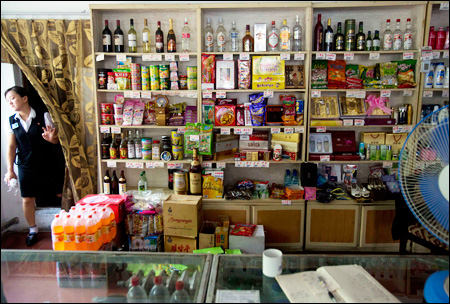NK seeks to fight inflation

A sales clerk emerges from the back room of a store open to foreigners in Hamhung, North Korea in this photograph taken Aug. 11. Inflation is reportedly soaring in the North. (Photo : Yonhap)
North Korea appears to be agonizing over how to curb rampant inflation, one of the most serious hurdles to developing its economy, an expert who frequently visits the country said Wednesday.
The expert, who recently traveled to Pyongyang, was told by officials that wages had been raised to cope with rising prices and that a session of the Supreme People’s Assembly (SPA) would discuss how to increase production. The officials did not elaborate, said the expert, asking to remain anonymous.
The economy was widely expected to be discussed during the SPA meeting on Sept. 25, but so far Pyongyang has only reported that the rubber-stamping parliament passed a new education law. Some speculate that economic issues were discussed but not publicized.
“I was told that putting in place measures to increase production would be discussed (at the meeting). I also heard that the raises had been given, even on a monthly basis,” the expert said. “The main reason (for the moves) is that people are earning more money but can buy less and less with it.”
The Daily NK, a website monitoring the North, has reported that the price of rice a common barometer of the country’s economy soared to 6,800 won per kilogram as of late last month, up from April when the figure stood at around 3,600 won.
The supply-demand gap, coupled with the sanctioned regime’s inability to bring in enough materials, is driving up prices, watchers say. Meanwhile, citizens, distrustful of the won after a disastrous 2009 currency reform, are seeking Chinese yuan, U.S. dollars and euros to insulate for economic instability. The expert said some shops in an upscale new area of the capital were operating exclusively on foreign currency despite catering to North Koreans.
A poor harvest and Pyongyang’s massive mobilization of resources ahead of celebrations for the 100th anniversary of the birth of its founder Kim Il-sung in April are also said to be factors.
Raising wages seems only to be a short-term fix, according to the expert.
“More money is being printed. More money but the same amount of goods means inflation,” he said.
New leader Kim Jong-un has prioritized the improvement of living conditions since taking power after the death of his father Kim Jong-il. His arrival has been accompanied by a revamping of Pyongyang that has included new apartments, leisure facilities and a hydroelectric plant servicing the capital.
The expert said consumer possibilities have increased remarkably, noting that supermarkets are offering new products such as pineapples, though prices were prohibitively high for most. While the improvements help maintain loyalty among the elite class, they could also serve to highlight a growing wealth divide, he said.
Some watchers suggest that such factors may be dragging on Pyongyang’s efforts to modernize under the Western-educated Kim. It has widely been reported that this summer the North passed down instructions regarding agricultural reform to boost output through incentives.
Under the measures, the regime said it would pay for 70 percent of output at market prices as well as for input to launch the new system. A lack of seed money could stand in its way, some believe.
Another expert, Ruediger Frank, said in an email that inflation is “one of the most serious issues of all” for the regime.
Frank, a professor of East Asian Economy and Society at the University of Vienna, said possible measures to stem inflation included “liberating” wages, as seen in China’s reform or massively increasing imports to push prices, though the latter would only be a short-term solution.
“Under conditions of undersupply the purchasing power of wage earners will constantly drop. This is politically not sustainable,” he said. <The Korea Times/Kim Young-jin>

























































